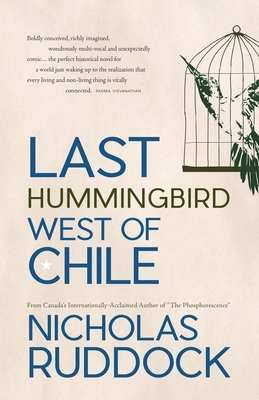Last Hummingbird West of Chile, by Nicholas Ruddock

This is a beautiful, evocative book that does some really unexpected things with point of view. Beginning in a stuffy, unhappy, upper-class Victorian English household with the birth of two children, the story eventually circumnavigates the globe and takes characters and readers on a series of adventures. Along the way, the point of view shifts, not just among several human characters but also to such unexpected first-person narrators as a tree, a donkey, and the titular hummingbird. It’s witty and it’s clever, but it’s also deeply insightful and heartfelt. Early on I was thinking that with so many point of view characters and so little time spent with each of them, they might not be developed enough for me to care deeply about any of them. But then a character death nearly made me cry and I realized that author Ruddock had achieved the difficult task of creating, with just a few handfuls of paragraphs, characters so real and believable that I cared intensely about their fate.
Though the style is different, much of the subject matter and theme of this book reminded me of Marina Endicott’s The Difference, one of my favourite novels of the last few years. Like that novel, much of that one is spent on the oceans of the world, in the age when travel by sail is soon to give way to travel by steamship. Also like The Difference, The Last Hummingbird reflects thoughtfully on the damage and dangers of colonialism — not just in the violence European humans have inflicted on other humans, but i the violence humans have inflicted on the natural world — right down to the hummingbirds.
I loved reading this book.



